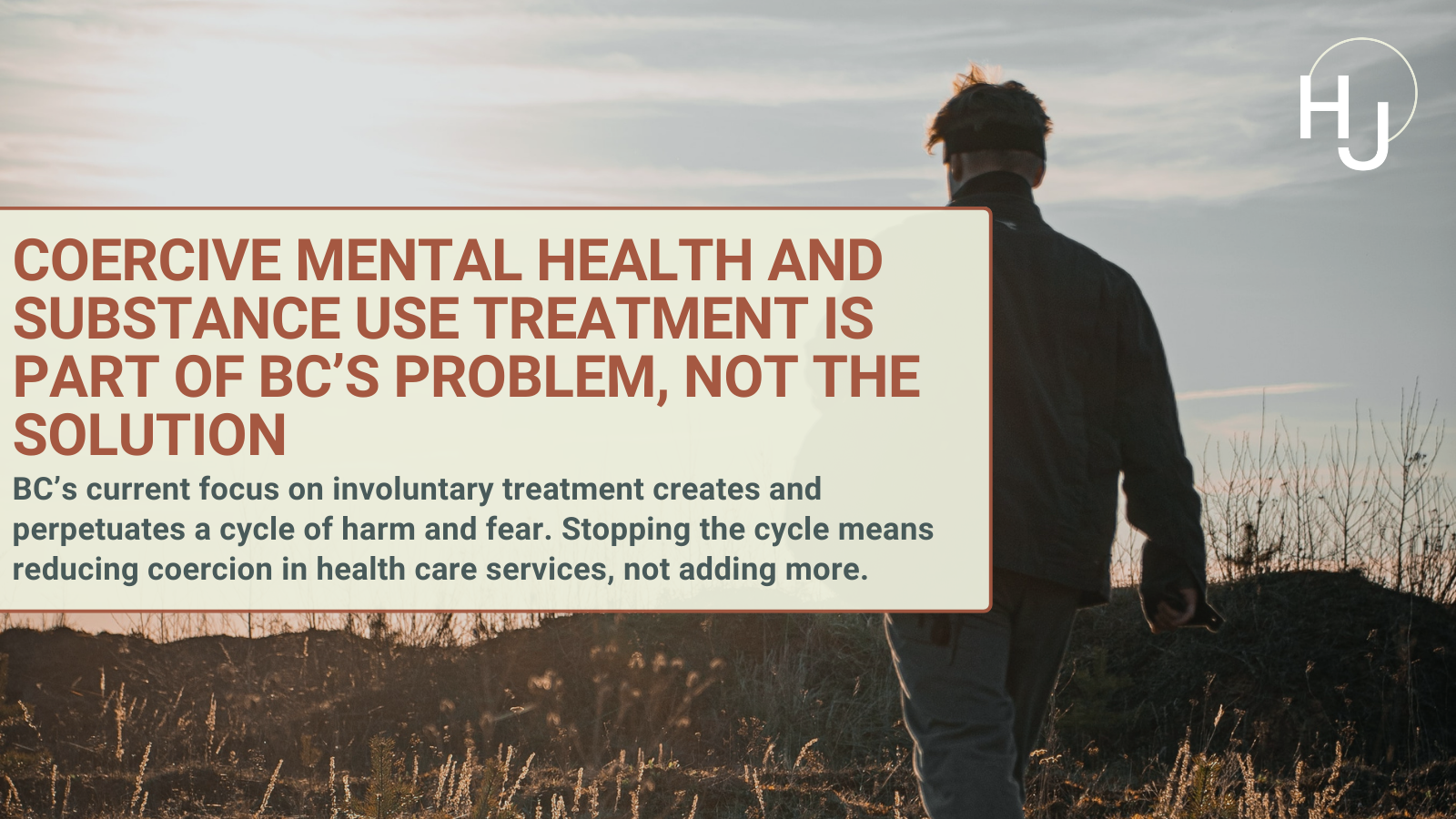Coercive mental health and substance use treatment is part of BC’s problem, not the solution
At Health Justice, we base our work in values including truth-telling, centering the voices of people with lived and living experience of involuntary mental health and/or substance use treatment in BC.
Here is the truth that they want to tell:
BC’s current focus on involuntary treatment creates and perpetuates a cycle of harm and fear. Stopping the cycle means reducing coercion in health care services, not adding more. Stopping the cycle requires prioritizing trust, accessibility, and agency.
This ambitious, hope-filled approach challenges the pessimistic and unproductive myths we see in current public debates. These debates place the cause of unmet mental health and substance use-related needs on the individual, rather than considering how the systemic reliance on the use of coercion may be part of the problem. Relying on deeply entrenched stereotypes assumes that people experiencing mental health or substance use-related health issues are just unwilling or unable to help themselves.
It’s time to consider whether BC’s approach to mental health and substance use services, and not individuals, may be causing the unmet health needs visible in communities in the province.
We have compelling evidence to show that the system itself doesn’t always help. BC’s mental health and substance use system has been the subject of research, investigations, and reports documenting a shortage of services, waitlists, the need for a broader array of publicly-funded services, problems with coordination, lack of long-term planning, and systemic racism and cultural problems.[1]
In reality, that means that someone in need of services to support their well-being faces many barriers to finding and accessing mental health and substance use services voluntarily. They may be deemed too ill for some services and not ill enough for others. Services may not meet the needs of people with brain injuries or other disabilities. If they meet eligibility requirements for one service, it can mean they are no longer eligible for other services. Necessary, evidence-based services may not be funded through BC’s public health system or they may be criminalized. A person may be ineligible for services because of where they live, cut off by arbitrary regional service delivery boundaries. They may be told they are too old for child and youth services, but “not mature enough” for adult services because those services are unsuitable for their developmental needs. They may go to an emergency department for help only to be refused admission.
We also need to be truthful about the services that a person does have access to because they are often unsafe or unwelcoming.
They are not equally accessible to Indigenous, Black, and otherwise racialized people; people who use drugs; gender diverse people; people who have experienced gender-based violence; or people experiencing homelessness.
These unresolved systemic issues in BC’s mental health and substance use services means that many people do not have real access to voluntary services that meet their needs. As a result, BC’s system is overly focused on involuntary treatment because many people are forced into crisis, and extraordinary state power that has severe human rights implications.
“The perceptions around involuntary treatment have become publicly idealized. What society thinks are the supports one receives when detained is completely divorced from reality.”
– Lived Experience Expert
We also have to be honest about what involuntary treatment looks like in BC:
There is a documented lack of accountability in that use of power;
There is no legal way for a person’s wishes or values to inform decisions about their treatment;
The use of seclusion and restraints is unregulated;
There may be no access to harm reduction services;
People are often discharged with no coordinated access to follow-up services; and
Involuntary treatment is an immensely stigmatized experience.
Some people with lived experience describe leaving involuntary treatment worse off than when they went in.
These experiences create real harm and fear. As a result, many people are understandably less likely to be willing to voluntarily access services, even services for their physical health. They are hesitant to trust a health care system that says it is there to help them. Instead, they distance themselves from the system to avoid being harmed again. They protect themselves. Because of this lack of trust, the next time they have mental health or substance use-related health needs, they are more likely to be forced into crisis. The cycle of coercion continues. More force is used to address their growing resistance.
What if BC chose to end the cycle of escalating coercion instead of entrenching it further?
Instead of focusing on authorizing new forms of involuntary treatment as the assumed solution, BC could ask people what they need. In BC, we are lucky to have a robust conversation amongst people with lived and living experience on how to change the system. Our community discusses things like having a diverse range of accessible voluntary services that prioritize building trust with the people who access them. It talks about the importance of mutuality, and supporting personal agency through tools that allow people to plan for how they want health decisions made if they are unwell. More than anything, it recognizes the essential need to ask the people who access services what would help improve their well-being without creating harm and fear in the very services they are supposed to trust. These (and many more) amazing ideas and solutions come from individuals and communities that have been hurt by the system – not the system itself.
Individuals and communities of lived and living experience offer a path to out of the system’s cycle of harm, and it begins with reforming BC’s Mental Health Act. It means rethinking the province’s focus on involuntary treatment and recognizing that it contributes to problems related to unmet mental health or substance use-related health needs in BC, not to solutions.
[1] Reports, investigations, and research:
https://rcybc.ca/wp-content/uploads/2021/01/RCY_Detained-Jan2021.FINAL_.pdf
https://bcombudsperson.ca/assets/media/OMB-Committed-to-Change-FINAL-web.pdf
https://bcombudsperson.ca/assets/media/Committed-to-Change_Report-Update_July21-2022.pdf
https://www.thevolcano.org/wp-content/uploads/2018/04/Pages-from-MH-REPORT-FINAL-1.compressed.pdf
https://engage.gov.bc.ca/app/uploads/sites/613/2020/11/In-Plain-Sight-Summary-Report.pdf
https://rcybc.ca/wp-content/uploads/2023/04/RCY-Toward-Inclusion-April2023_FINAL.pdf
https://rcybc.ca/wp-content/uploads/2022/09/RCY-ParentsResponsibility-Sept2002.pdf
https://dewc.ca/wp-content/uploads/2019/03/MMIW-Report-Final-March-10-WEB.pdf
https://vancouver.citynews.ca/2021/07/23/bc-mental-health-waits-system/

